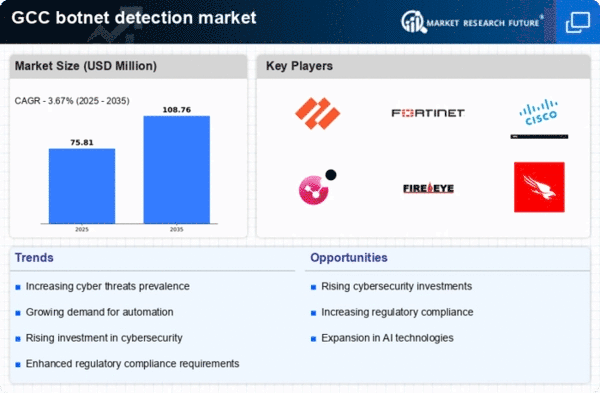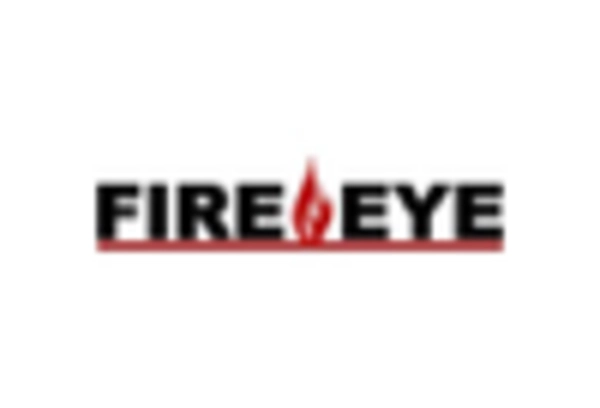Rising Adoption of IoT Devices
The proliferation of Internet of Things (IoT) devices in the GCC is a key driver for the botnet detection market. As more devices become interconnected, the potential attack surface for cybercriminals expands, making IoT devices attractive targets for botnet attacks. It is estimated that the number of IoT devices in the region will exceed 1 billion by 2025, creating a pressing need for effective botnet detection solutions. Organizations are increasingly aware of the vulnerabilities associated with these devices, prompting them to seek advanced detection technologies to mitigate risks. This trend suggests that the botnet detection market will likely see heightened demand as businesses strive to secure their IoT ecosystems against potential threats.
Increasing Cyber Threat Landscape
The botnet detection market is experiencing growth due to the escalating cyber threat landscape in the GCC region. As organizations increasingly rely on digital infrastructure, the frequency and sophistication of cyberattacks have surged. Reports indicate that cybercrime costs in the GCC could reach $25 billion by 2025, highlighting the urgent need for robust security measures. This environment compels businesses to invest in advanced botnet detection solutions to safeguard their assets. The rising number of Distributed Denial of Service (DDoS) attacks, which often utilize botnets, further emphasizes the necessity for effective detection mechanisms. Consequently, the demand for innovative technologies in the botnet detection market is likely to rise, as organizations seek to mitigate risks and protect sensitive information.
Government Initiatives and Support
Government initiatives aimed at enhancing cybersecurity in the GCC are significantly influencing the botnet detection market. Various national cybersecurity strategies have been implemented to combat cyber threats, with a focus on fostering public-private partnerships. For instance, the establishment of cybersecurity frameworks and funding for research and development in the region indicates a commitment to improving digital security. The GCC governments are likely to allocate substantial resources to bolster their cybersecurity infrastructure, which may include investments in botnet detection technologies. This proactive approach not only enhances national security but also encourages businesses to adopt advanced solutions, thereby driving growth in the botnet detection market.
Emerging Cybersecurity Technologies
The emergence of new cybersecurity technologies is reshaping the botnet detection market in the GCC. Innovations such as behavioral analytics, threat intelligence, and machine learning are being integrated into detection solutions, enhancing their effectiveness against sophisticated botnet attacks. As organizations seek to stay ahead of evolving threats, the adoption of these advanced technologies is likely to increase. The market for cybersecurity solutions in the GCC is expected to grow at a CAGR of 12% through 2025, indicating a robust demand for innovative botnet detection mechanisms. This trend suggests that companies will prioritize investments in cutting-edge technologies to bolster their defenses against cyber threats, further propelling the growth of the botnet detection market.
Growing E-commerce and Digital Transactions
The rapid growth of e-commerce and digital transactions in the GCC is significantly impacting the botnet detection market. With online shopping and digital payment systems becoming more prevalent, the risk of cyberattacks targeting these platforms has increased. Reports indicate that e-commerce sales in the GCC are projected to reach $28 billion by 2025, underscoring the importance of securing online transactions. Cybercriminals often exploit vulnerabilities in these systems using botnets, making effective detection solutions essential for businesses. As a result, organizations are likely to invest in advanced botnet detection technologies to protect their digital assets and maintain consumer trust, thereby driving growth in the market.
















